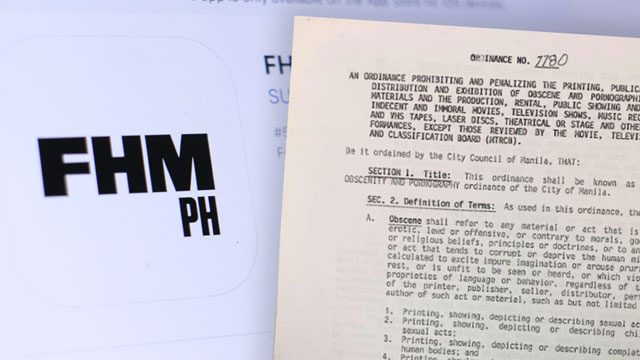SUMMARY
This is AI generated summarization, which may have errors. For context, always refer to the full article.

MANILA, Philippines – Men’s magazine FHM has failed to convince the Supreme Court to strike down as unconstitutional a local ordinance in Manila that bans obscenity, an ordinance that was used to prosecute the magazine and other publications.
In a 9-4 ruling promulgated September 24 but released to media only on January 22, 2020, majority of the justices chose to take a hands-off approach to avoid judicial legislation, seen as the Court restraining itself not to overstep the authority of lawmakers.
Four dissenters, led by Associate Justice Marvic Leonen, wanted to strike down the ordinance as unconstitutional for being too overbroad, and which might restrain free speech.
Manila Public Information Chief Julius Leonen confirmed to Rappler that the measure, Ordinance No. 7780, is still in effect. (READ: Artists, musicians raise funds to free activists who spray-painted LRT posts)
What’s the case? FHM – a glossy men’s magazine that stopped print operations in 2018 – filed the petition before the Supreme Court in 2008 as an offshoot of being prosecuted under the ordinance.
A group of pastors and preachers, led by then Manila 6th District Representative and now House Minority Leader Bienvenido Abante filed a complaint against FHM and other publications, particularly tabloids, for violating Ordinance No. 7780 or Manila’s Anti-Obscenity measure.
Note that Abante was the principal author of the ordinance. Abante’s group also sued the publications for violating Articles 200 (grave scandal) and 201 (obscene publications) of the Revised Penal Code.
Manila’s City Prosecutor Office dismissed the complaints for violating the ordinance and Article 200. The case that prospered in the lower court is for violation of Article 201(3) which punishes “those who shall sell, give away or exhibit films, prints, engravings, sculpture or literature which are offensive to morals.”
The Jardeleza ponencia dismissed the petition as moot because Manila prosecutors didn’t push through with the case related to the ordinance.
The majority justices said: “Until the proper case presents itself, prudence dictates that the Court should exercise judicial restraint.”
Jardeleza got concurrences from Chief Justice Diosdado Peralta, Associate Justices Benjamin Caguioa, Andres Reyes Jr, Jose Reyes Jr, Ramon Paul Hernando, Amy Lazaro-Javier, Henri Inting and Rodil Zalameda.
What did dissenters say? Associate Justice Marvic Leonen said that the Court should have tackled the constitutionality of the ordinance because it might be used to prosecute free speech again in the future.
“The dismissal of the criminal cases against petitioners does not mean that no other person will be penalized under the Ordinance. Its constitutionality, therefore, is an issue that is precisely ‘capabale of repetition, yet evading review’,” said Leonen.
Another dissenter Senior Associate Justice Estela Perlas Bernabe said the ordinance must be struck down for being overbroad.
“It violates substantive due process under an overbreadth analysis, which is one of the known methods of reviewing the constitutionality of an ordinance or a law,” said Bernabe.
The Jardeleza ponencia also argued that because obscenity is unprotected speech, then it is not a free speech issue.
But Bernabe and Leonen argued that the language of the ordinance was too broad that it may infringe on free speech.
“A statute that is broadly written which deters free expression can be struck down on its face because of its chilling effect even if it also prohibits acts that may legitimately be forbidden,” said Bernabe.
Leonen said the ordinance did not take into account that the modern audience has a different standard of what is obscene, noting that FHM’s readers were 40% female.
“As it stands, Ordinance no. 7780 is a feeble attempt to legislate morality. It prevents adults, who have complete autonomy over their morals and choices, from pursuing what may be their own personal interests,” said Leonen.
Retired senior associate justice Antonio Carpio and Associate Justice Rosmari Carandang adopted Leonen’s dissent. – Rappler.com
Add a comment
How does this make you feel?
There are no comments yet. Add your comment to start the conversation.